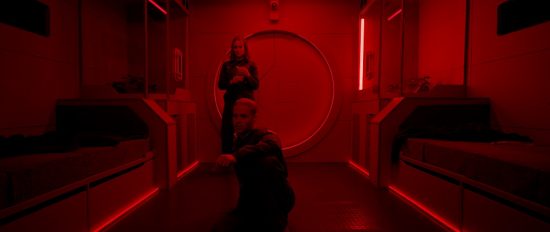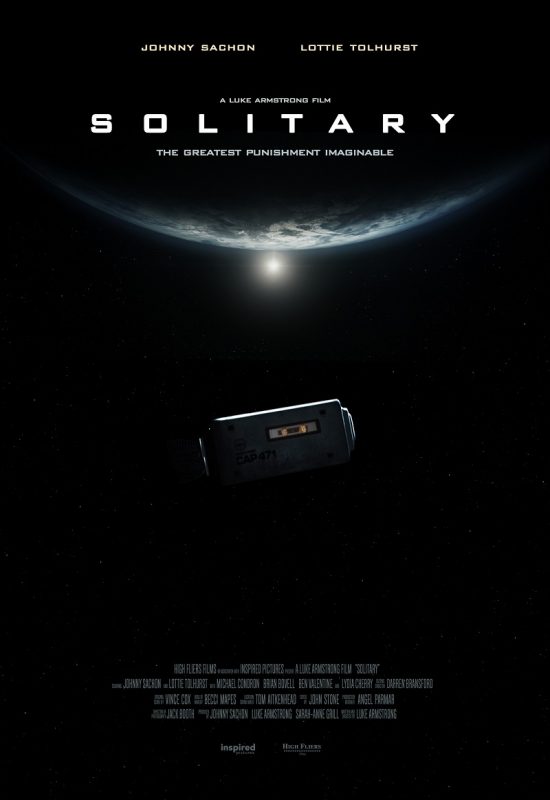Review: Solitary – “Inventive and impressive visuals”
Solitary is the feature-length debut for Writer / Director Luke Armstrong. This sci-fi thriller is set in 2044, where the Earth’s resources have been depleted to the point that prisoners are sent into space to work in off-world colonies for the rest of their life. The story follows Isaac Havelock (Johnny Sachon), an ex-soldier who, at the start of the film, is on the run from mysterious men dressed in black armed with guns. Isaac is captured and wakes up onboard a space ship’s escape pod, now a prisoner, having been sent to work in an off-world colony. In the pod with him is fellow prisoner Alana Skill (Lottie Todhurst) and the pod’s computer. Between them, they face a race against time to plot a course back to Earth and discover the truth behind their predicament.
Filmed during lockdown, writer and director Armstrong does a great job of creating a futuristic world with limited external scenes, using cleverly crafted CGI, taking the London skyline into the future. The opening scenes on the streets of London are careful to draw the eye to the foreground and away from any background tell-tale signs of current technology. Armstrong has previously helped create visual effects on franchises such as Bond, Marvel and Fantastic Beasts and his expertise is evident in creating inventive ways of submerging the audience in a futuristic world on a budget that wouldn’t cover the catering for a week on a Hollywood franchise shoot. Taking this into account, the film looks great for what it is, an insular, low budget sci-fi thriller. The soundtrack by Vince Cox is atmospheric and the opening scene’s music, in particular, evokes memories of Blade Runner, which sets the hopes high. Unfortunately, hope does not remain for long.
The writing suffers from a lack of focus, where various plotlines are picked up and left with no conclusion or arc. The ethical treatment of prisoners, the intrusion of the media, and gambling addiction are all plot devices introduced at points throughout the film and then discarded without any real satisfying conclusions for any of them. There are also various plot holes throughout the film such as why does a fire break out in a box with plants in? How does a live TV news programme contact the prison pod in space when ‘mission control’ object to it and why is the film called Solitary when at no point is the main character ever in their cell on their own?
The characters are two dimensional at best, with Havelock’s back story as ex-military with a girlfriend whom we later find out has a gambling problem and is double-crossed trying to pay off her debts. This is the extent of the character development. There is nothing wrong with such flimsy characterisation when the film can throw millions of dollars at the screen in terms of action and CGI to distract us from Nolan’s gaping plot holes, Unobtanium or Arnie’s delivery of his lines. But independent films with no budget do not have that luxury and can only compete with larger, studio funded films in the writing. In the case of Solitary, this feels like a great opportunity missed. Great drama can exist in the most claustrophobic of spaces. It’s fair to say that not every film can be 12 Angry Men, Sleuth or Moon, but some attention to character development goes a very long way to persuading the audience to care about what happens. By the end of this film, the audience knows very little about the characters involved and cares even less about them.
The performances were also found wanting. At no point did the main character ever come across as a believable ex-soldier. Sachon’s practiced diction came across as not long out of drama school, rather than a foot soldier down on his luck and the dialogue by the whole cast was delivered with no faith or authenticity. A particular scene where Havelock speaks on the phone to his girlfriend was performed with no feeling whatsoever, giving the impression the cast had no faith in the script. If the actors appear to not buy into the dialogue, why should the audience?
A low budget does not necessarily mean low quality. A film does not need big budget visuals to succeed. Good writing and committed performances can carry a film a long way. Unfortunately, Solitary is a film that does little to capture the audience’s interest with either the writing or performances and no amount of inventive and impressive visuals can make up for that.
Solitary is released across multi-platforms and in all major retailers on Monday 31 August.












